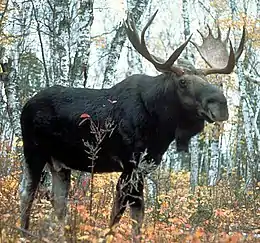alnis
Latvian

Etymology
From Proto-Baltic *alnis, from a derived form of Proto-Indo-European *el-, *ol-, *h₁el- (“white, light, also reddish-brown color”) (maybe *h₁elh₁ēn). In ancient Latvian, alnis must have meant “deer” (in general), as in other Baltic languages; in this sense, however, the word disappeared, perhaps as a consequence of the diminishing numbers of this species in nature. J. Alunāns reintroduced it into the literary language in the 19th century with its original meaning (“deer”), but, by the beginning of the 20th century, it had changed to its modern meaning (“elk”). Cognates include Lithuanian élnias, dialectal álnis (“deer”), Old Prussian alne (“wild animal”) (probably earlier “female deer”), Old Church Slavonic лани (lani), Russian лань (lanʹ), Czech laně (“female deer”), Proto-Slavic *(j)elenь (Old Church Slavonic ѥлєнь (jelenĭ), Russian and Ukrainian оле́нь (olénʹ), Belarusian але́нь (aljénʹ), Bulgarian еле́н (elén), Czech jelen, Polish jeleń), Ancient Greek ἑλλός (hellós, “dear-calf”), ἔλαφος (élaphos, “deer”) (< *eln̥bhos)[1].
Pronunciation
- IPA(key): [âlnis]
| (file) |
Noun
alnis m (2nd declension)
Declension
References
- Karulis, Konstantīns (1992), “alnis”, in Latviešu Etimoloģijas Vārdnīca (in Latvian), Rīga: AVOTS, →ISBN